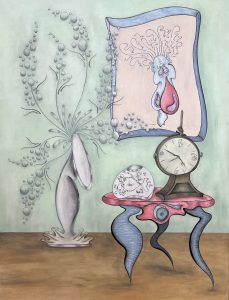History’s Mysteries Part 3 of 4 (Alternate links to Part 1 and Part 2)
I admit I’m a Shakespeare fan. If he were writing today, I’d go to every book signing or opening night, wearing a Bardteeshirt after standing in line in the rain. My foray began when I was in fifth grade and my teacher, frustrated that I had completed the curriculum months ahead of the class, had to find something to occupy me. Or I would annoy her every second.
She set the challenge, handing me A Midsummer Night’s Dream. “Read this.”
I opened it. “It’s poems.”
“It’s not. It’s Shakespeare.”
I examined the cover. Shakespeare. I thought that was college stuff. “Can I even read this thing?”
“We’ll see.”
I’m sure she was thinking “anything to shut you up.” But I read it. Took a few weeks and lots of trips to the dictionary and her desk. But her idea opened my world to the person I consider the model of all writers.
I modeled my first book, Treasure, after his The Tempest. And, in that effort, spent a lot of my time incorporating his life — and the mysteries surrounding his life — into my novel.
So, what don’t you know about The Bard?
For our third installment of History’s Mysteries, we need to have a little backstory before we examine the big mystery surrounding Shakespeare.
More than 400 words are confirmed as credited to Shakespeare. Some insist those he created number nearer to 1700; critics and linguists attempt to verify the origin of each word. In most cases, he was the first to use the word in print — and for many of the words and phrases, he is the inventor. He often combined words, changed nouns into verbs, changed verbs into adjectives, added prefixes and suffixes, and so on.
It has taken me two days to research and collect, and attempt to validate, the words and phrases good old Will added to the English language. Here are the results of my attempt. Words are listed alphabetically. I found 475, but some are in question. Citation and criticism of origin is noted when I found it. Feel free to skip around or come back whenever you need just the right word!
(You can scroll past this list for more content…)
1. abstemious (The Tempest)
2. academe (Love’s Labour’s Lost)
3. accessible
4. accommodation (Othello)
5. accused (maybe first time used as a noun; Richard II)
6. admirable
7. advertising (Measure for Measure)
8. aerial (Othello)
9. airless
10. alligator (Spanish version: aligarto)(Romeo and Juliet)
11. amazement (first use as a noun)
12. anchovy (Henry IV, Part 1)
13. arch-villain (Timon of Athens)
14. arouse, to arouse (Henry VI, Part 2; Hamlet)
15. auspicious
16. bachelorship (Henry VI, Part 1)
17. backing (Henry VI, Part 1)
18. ballad-monger (Henry IV)
19. bandit (Henry VI, Part 2)
20. barber, to barber
21. barefaced (Macbeth)
22. baseless (The Tempest)
23. batty
24. beachy
25. bedabble, to bedabble
26. bedazzle (The Taming of the Shrew)(disputed)
27. bedroom (A Midsummer Night’s Dream)
28. belly, to belly
29. belongings (Measure for Measure)
30. besmirch, to besmirch (Henry V)
31. bet, to bet
32. bethump, to bethump
33. birthplace (Coriolanus)
34. black-faced
35. blanket, to blanket (first use as verb; King Lear)
36. bloodstained (Titus Andronicus)
37. bloodsucking
38. blushing
39. blusterer (A Lover’s Complaint)
40. bodkins
41. bold-faced (Henry IV, Part 1)
42. bottled (Richard III)
43. braggartism
44. breached
45. brisky
46. broomstaff
47. budger
48. bump (Romero and Juliet)
49. buzzer (Hamlet)
50. cake, to cake, caked (Timon of Athens)
51. candle holder
52. canopy, to canopy
53. castigate, to castigate (Timon of Athens)
54. cater, to cater (As You Like It)
55. catlike
56. champion, to champion (Macbeth)
57. characterless
58. cheap
59. chimney-top
60. chopped
61. churchlike
62. circumstantial (As You Like It)
63. clangor (Henry IV, Part 2)
64. cold-blooded (King John)
65. coldhearted (Anthony and Cleopatra)
66. compact
67. comply, to comply (Othello)
68. compromise, to compromise (Merchant of Venice)
69. consanguineous (Twelfth Night)
70. control (Twelfth Night)
71. coppernose
72. countless (Titus Andronicus)
73. courtship (disputed)
74. cow, to cow (Macbeth)
75. critical (Love’s Labour’s Lost)
76. cruelhearted (Two Gentlemen of Verona)
77. cudgel, to cudgel
78. Dalmatian (Cymbeline)
79. dapple, to dapple
80. dauntless (Macbeth)
81. dawn (Henry V)
82. day’s work (several plays)
83. deafening (Henry IV, Part 2)
84. deaths-head
85. defeat
86. denote, to denote (several uses)
87. depository
88. design (disputed)
89. dewdrop
90. dexterously (Twelfth Night)
91. discandy
92. discontent (Richard III)
93. disedge (to blunt)
94. disgraceful (Henry VI, Part 1; meaning not graceful)
95. dishearten, to dishearten (Henry V; disputed)
96. dislocate, to dislocate (King Lear)
97. disorb
98. disseat
99. distasteful (Timon of Athens)
100. distracted (Hamlet)
101. distrustful
102. disturbed (Venus and Adonis)
103. divest (Henry V)
104. dog-weary
105. doit
106. domineering (Love’s Labour’s Lost)
107. downstairs (Henry IV, Part 1)
108. droplet (Timon of Athens)
109. drugged, to drug (first use as verb, Macbeth)
110. dwindle, to dwindle (Henry IV, Part 1)
111. East Indies
112. educated, to educated (Love’s Labour’s Lost)
113. elbow, to elbow, elbowed (first use as verb, King Lear)
114. Embrace (first use as a noun, Henry VI, Part 1)
115. Employer (Much Ado About Nothing)
116. Employment
117. Enfranchisement
118. Engagement (several plays)
119. enmesh, to enmesh (Othello)
120. Enrapt (Trollius and Cressida)
121. ensnare (Othello)
122. enthrone, to enthrone (Anthony and Cleopatra)
123. epileptic (King Lear)
124. equivocal (Othello)
125. eventful (As You Like It)
126. excitement (first use as noun, Hamlet)
127. expedience
128. expertness
129. exposure
130. eyeball (Henry IV, Part 1, The Tempest)(disputed)
131. eyedrop (Henry IV, Part 2)
132. eyesore (Taming of the Shrew)
133. eyewink
134. fair-faced
135. fairyland
136. fancy-free (Midsummer Night’s Dream)
137. fanged (Hamlet)
138. fap
139. far-off
140. farmhouse (The Merry Wives of Windsor)
141. fashionable (Trolius and Cressida)
142. fashionmonger
143. fat-witted
144. fathomless (Troilus and Cressida)
145. featureless
146. fiendlike
147. fishify, to fishify
148. fitful (Macbeth)
149. fixture (The Winter’s Tale)
150. flawed (first use as an adjective, King Lear)
151. fleshment
152. flirt-gill
153. flowery (A Midsummer Night’s Dream)
154. fly-bitten
155. footfall
156. foppish (King Lear)
157. foregone
158. fortune-teller (The Comedy of Errors)
159. foul-mouthed (several plays)
160. Franciscan
161. freezing (Cymbaline)
162. fretful
163. full-grown (Pericles)
164. fullhearted
165. futurity
166. gallantry (Troilus and Cressida)
167. garden house
168. generous
169. gentlefolk
170. gloomy (used as descriptive)
171. glow (several plays)
172. glutton, to glutton
173. gnarl, to gnarl, gnarled (Measure for Measure)
174. go-between (several plays)
175. gossip (The Comedy of Errors), to gossip
176. grass plot
177. gravel-blind
178. gray-eyed
179. green-eyed
180. grief-shot
181. grime
182. grovel, to grovel (Henry IV)
183. gust (Henry VI, Part 3)
184. half-blooded (King Lear)
185. happy, to happy
186. heartsore
187. hedge-pig
188. hell-born
189. hinge, to hinge
190. hint (Othello)
191. hobnail (Henry IV, Part 1)
192. hobnob (Twelfth Night)
193. homely
194. honey-tongued (The Merry Wives of Windsor)
195. hoodwinked (common falconry term)
196. hornbook
197. hostile
198. hot-blooded (King Lear)
199. housekeeping (The Taming of the Shrew)
200. howl
201. humor, to humor (first use as verb, Taming of the Shrew)
202. hunchbacked
203. hurly
204. hurried (The Comedy of Errors)
205. idle-headed
206. ill-tempered
207. ill-used
208. immediacy (first use as noun, King Lear)
209. impartial
210. impede, to impede
211. imploratory
212. import; importantly (first use as adverb, Cymbeline)
213. in question
214. inaudible (All’s Well That Ends Well)(disputed)
215. inauspicious (Romeo and Juliet)
216. indirection
217. indistinguishable (Troilus and Cressida)
218. inducement
219. informal
220. inhearse, to inhearse
221. inlay, to inlay
222. instate, to instate
223. inventorially
224. investment (Henry IV, Part 2)
225. invitation (The Merry Wives of Windsor)
226. invulnerable (King John and others)
227. jaded (Henry VI, Part 2)
228. judgement day (Henry VI, Part 1)
229. juiced (Merry Wives of Windsor)
230. keech
231. kickie-wickie
232. kissing (Love’s Labour’s Lost)
233. kitchen-wench
234. label
235. lackluster (As You Like It)
236. ladybird (Romeo and Juliet)
237. lament
238. land-rat
239. lapse, to lapse
240. laughable (The Merchant of Venice)
241. leaky (The Tempest, Anthony and Cleopatra)
242. leapfrog (Henry V)
243. lewdster
244. loggerhead
245. lonely (Coriolanus)
246. long-legged
247. love letter
248. lower
249. luggage
250. lustihood
251. lustrous (Twelfth Night)
252. madcap
253. madwoman
254. majestic, majestically (Henry IV, Part 1)
255. malignancy (Twelfth Night)
256. manager (Love’s Labour’s Lost; Midsummer Night’s Dream)
257. markable
258. marketable (As You Like It)
259. marriage bed
260. metamorphize
261. militarist (All’s Well That Ends Well)
262. mimic (A Midsummer Night’s Dream)
263. misgiving (Julius Caesar)
264. misquote (Henry IV, Part 1)
265. mockable
266. money’s worth (Love’s Labours Lost)
267. monumental
268. moonbeam (A Midsummer Night’s Dream)
269. mortifying (Merchant of Venice)
270. motionless (Henry V)
271. mountaineer (Cymbeline)
272. muddy, to muddy
273. multitudinous (Macbeth)
274. neglect
275. negotiate, to negotiate (Much Ado About Nothing)
276. nervy (Coriolanus)
277. neverending
278. new-fallen (Venus and Adonis)
279. new-fangled (Love’s Labour’s Lost)
280. newsmonger
281. nimble-footed
282. noiseless (King Lear)
283. nook-shotten
284. numb, to numb (King Lear)
285. obscene (Love’s Labour’s Lost)
286. obsequiously (first use as adverb)
287. ode
288. offcap, to offcap
289. offenseful
290. offenseless
291. Olympian
292. on purpose
293. operate, to operate
294. oppugnancy
295. out-talk, to out-talk
296. outbreak (Hamlet)
297. outdare, to outdare (Henry IV, Part 1)
298. outfrown, to outfrown
299. outscold, to outscold
300. outsell, to outsell
301. outstay (As You Like It)
302. outweigh, to outweigh
303. over-cool (Henry IV, Part 2)
304. over-ripened (Henry VI, Part 2)
305. over-weathered (The Merchant of Venice)
306. overblown
307. overcredulous
308. overgrowth
309. overpay, to overpay
310. overpower, to overpower
311. overrate, to overrate
312. overview
313. pageantry (Pericles)
314. palate, to palate
315. pale-faced (A Midsummer Night’s Dream)
316. pander, to pander
317. panders
318. paternal
319. pebbled
320. pedant, pedantical (The Taming of the Shrew)
321. pendulous
322. perplex, to perplex (King John)
323. petition, to petition
324. pignut
325. pious
326. please-man
327. plumpy
328. posture
329. prayerbook
330. premeditated (disputed)
331. priceless
332. profitless
333. Promethean
334. protester
335. published
336. puking (As You Like It) (disputed)
337. puppy dog (King John)
338. pushpin
339. quarrelsome
340. questioning (As You Like It)
341. radiance
342. rant (Hamlet), to rant
343. rascally
344. rawboned
345. reclusive
346. refractory
347. reinforcement
348. reliance
349. remorseless
350. reprieve
351. resolve
352. restoration
353. restraint
354. retirement
355. reverb, to reverb
356. revokement
357. revolting
358. reword, to reword
359. ring carrier
360. rival, to rival
361. roadway
362. roguery
363. rose-cheeked
364. rose-lipped
365. rumination
366. ruttish
367. sanctimonious
368. sate, to sate
369. satisfying
370. savagery (King John)
371. schoolboy
372. scrimmer
373. scrubbed
374. scuffle (Anthony and Cleopatra)
375. seamy
376. secure, to secure
377. self abused
378. shipwrecked
379. shooting star
380. shudder
381. silk stocking
382. silliness
383. sire, to sire
384. skim milk (Henry IV, Part 1)
385. skimble-skamble
386. slugabed
387. sneak, to sneak
388. soft-hearted
389. spectacled
390. spilth
391. spleenful
392. sportive
393. squabble, to squabble
394. stealthy
395. stillborn
396. subcontract, to subcontract
397. submerge
398. successful
399. suffocating
400. sully, to sully
401. summit
402. supervise, to supervise
403. swagger, to swagger (Henry V)
404. tardiness
405. time-honored
406. title page
407. to forward (first use as a verb; Henry IV, Part 1)
408. to launder
409. to out-Herod
410. to out-villain
411. torture, to torture (King Henry VI)
412. traditional (Richard III)
413. tranquil
414. transcendence
415. trippingly
416. unaccommodated
417. unappeased
418. unbosom, to unbosom
419. unchanging
420. unclaimed
421. uncomfortable (Romeo and Juliet)
422. uncurl, to uncurl
423. undervalue, to undervalue
424. undress (The Taming of the Shrew)
425. unearthly
426. uneducated
427. unfool, to unfool
428. unfrequented
429. ungoverned
430. ungrown
431. unhappy, to unhappy
432. unhelpful
433. unhidden
434. unlicensed
435. unmitigated
436. unmusical
437. unmuzzle, to unmuzzle
438. unpolluted
439. unpublished
440. unquestionable
441. unquestioned
442. unreal (Macbeth)
443. unrivaled
444. unscarred
445. unscratched
446. unsex, to unsex
447. unsolicited
448. unsullied
449. unswayed
450. untutored
451. unvarnished
452. unwillingness
453. upstairs
454. useful
455. useless
456. valueless
457. varied
458. varletry
459. vasty
460. vaulting
461. vulnerable
462. watchdog
463. waterdrop
464. waterfly
465. well-behaved
466. well-bred
467. well-educated
468. well-read
469. widen, to widen
470. wittily
471. worn out
472. worthless
473. wry-necked
474. yelping (Henry VI, Part 1)
475. zany (Love’s Labour’s Lost)
KNOCK KNOCK JOKES
Knock, knock. Who’s there?
Shakespeare.
Shakespeare who?
The guy who invented knock, knock jokes, that’s who.
Shakespeare introduced us to the knock, knock joke in the porter scene in Macbeth. In the Scottish Play, Macbeth, the third scene of the second act is meant as a humourous relief to the tension of the horrible murders and the building horror and tension.
After knock, knock, scholars have attributed over 150 phrases to The Bard. Let’s take a look. You will be surprised at how often you are quoting him!
1. a dish fit for the Gods (fit for a king / Julius Caesar)
2. a horse, a horse! My kingdom for a horse! (Richard III)
3. a piece of work
4. a sorry sight
5. all our yesterdays (Macbeth)
6. all that glitters is not gold (glisters, The Merchant of Venice)
7. all’s well that ends well (title)
8. as good luck would have it (The Merry Wives of Windsor)
9. as merry as the day is long (Much Ado About Nothing)
10. bag and baggage (As You Like It / Winter’s Tale)
11. bated breath (The Merchant of Venice)
12. be all, end all (Macbeth)
13. bear a charmed life (MacBeth)
14. beggar all description (Anthony and Cleopatra)
15. better foot before (best foot forward) (King John)
16. blinking idiot (The Merchant of Venice)
17. brave new world (The Tempest)
18. break the ice (Taming of the Shrew)
19. breathed his last (Henry VI)
20. brevity is the soul of wit (Hamlet)
21. catch a cold (Cymbeline; disputed)
22. cold comfort (Taming of the Shrew)
23. come what may (come what come may / Macbeth)
24. conscience does make cowards of us all (Hamlet)
25. crack of doom (Macbeth)
26. cruel to be kind (Hamlet)
27. dead as a doornail (Henry VI)
28. devil incarnate (Titus Andronicus)
29. dog will have his day (Hamlet; disputed)
30. dogs of war (Julius Caesar)
31. eaten me out of house and home (Henry IV, Part 2)
32. elbow room (King John)
33. faint hearted (Henry VI, Part 1)
34. fair play, foul play
35. fancy-free (Midsummer Night’s Dream)
36. fight fire with fire
37. fight till the last gasp (Henry VI, Part 1)
38. flaming youth (Hamlet)
39. for goodness’ sake (Henry VIII)
40. foregone conclusion (Othello)
41. forever and a day (As You Like It)
42. full circle (King Lear)
43. give the devil his due (I Henry IV)
44. good riddance (Trollius and Cressida)
45. green-eyed monster (Othello)
46. heart of gold (Henry V)
47. high time (The Comedy of Errors)
48. hoist with his own petard (Hamlet)
49. ill wind which blows no man to good (Henry IV, Part 2)
50. improbable fiction (Twelfth Night)
51. in a better world than this (As You Like It)
52. in a pickle (The Tempest)
53. in my book of memory (Henry VI, Part 1)
54. in my heart of hearts (Hamlet)
55. in my mind’s eye (Hamlet)
56. infinite space (Hamlet)
57. infirm of purpose (Macbeth)
58. it’s all Greek to me (Julius Caesar)
59. itching palm (Julius Caesar)
60. kill with kindness (Taming of the Shrew)
61. killing frost (Henry VIII)
62. knit brow (The Rape of Lucrece)
63. knock knock (Macbeth)
64. laid on with a trowel (As You Like It)
65. laugh yourself into stitches (Twelfth Night)
66. laughing stock (The Merry Wives of Windsor)
67. lean and hungry look (Julius Caesar)
68. lie low (Much Ado About Nothing)
69. live long day (Julius Caesar)
70. love is blind (Merchant of Venice)
71. make a virtue of necessity (The Two Gentlemen of Verona)
72. makes your hair stand on end
73. melted into thin air (The Tempest)
74. method to my madness (Hamlet)
75. milk of human kindness (Macbeth)
76. ministering angel (Hamlet)
77. misery acquaints a man with strange bedfellows (The Tempet)
78. more honored in breach than in the observance (Hamlet)
79. more in sorry than in anger (Hamlet)
80. more sinned against than sinning (King Lear)
81. much ado about nothing (title)
82. murder most foul (Hamlet)
83. naked truth (Love’s Labour’s Lost)
84. neither borrower nor a lender be (Hamlet)
85. neither rhyme nor reason (The Comedy of Errors; As You Like It)
86. no such thing (Macbeth; ?)
87. not slept one wink (Cymbeline)
88. obvious as the nose on your face (The Two Gentlemen of Verona)
89. off with his head
90. once more into the breach (Henry V)
91. one fell swoop (Macbeth)
92. one that loved not wisely but too well (Othello)
93. out of the jaws of death (Twelfth Night)
94. own flesh and blood (Hamlet)
95. parting is such sweet sorrow (Romeo and Juliet)
96. piece of work, what a piece of work is man (Hamlet)
97. plague on both your houses (Romeo and Juliet)
98. play fast and loose (King John)
99. pomp and circumstance (Othello)
100. pound of flesh (The Merchant of Venice)
101. primrose path (Hamlet)
102. refuse to budge an inch (Measure for Measure)
103. salad days (Anthony and Cleopatra)
104. sea change (The Tempest)
105. seen better days (As You Like It)
106. send him packing (Henry V, Part 1)
107. set your teeth on edge (Henry IV, Part 1)
108. shall I compare thee to a summer’s day? (Sonnets)
109. short and long of it (The Merry Wives of Windsor)
110. short shrift (Richard III)
111. sick at heart (Hamlet)
112. smells to heaven (Hamlet)
113. snail paced (Troilus and Cressida)
114. so-so (As You Like It)
115. something in the wind (The Comedy of Errors)
116. something wicked this way comes (Macbeth)
117. sorry sight (Macbeth)
118. sound and fury (Macbeth)
119. spotless reputation (Richard II)
120. star-crossed lovers (Romeo and Juliet)
121. sterner stuff (Julius Caesar)
122. still waters run deep; Smooth runs the water where the brook is deep (Henry VI, Part 2)
123. stony hearted (Henry IV, Part 1)
124. strange bedfellows (The Tempest)
125. such stuff as dreams are made on (The Tempest)
126. sweet are the uses of adversity (As You Like It)
127. sweets to the sweet (Hamlet)
128. swift as a shadow (A Midsummer Night’s Dream)
129. tedious as a twice-told tale (King John)
130. tell truth and shame the devil (Henry IV, Part 1)
131. the clothes make the man (Hamlet)
132. the game is afoot (Henry IV, Part 1)
133. the game is up (Cymbeline)
134. the world is my oyster
135. there’s the rub (Hamlet)
136. this mortal coil (Hamlet)
137. time is out of joint (Hamlet)
138. tis high time (The Comedy of Errors)
139. to gild the lily; To gild refined gold, to paint the lily (King John)
140. to thine own self be true (Hamlet)
141. too much of a good thing (As You Like It)
142. tower of strength (Richard III)
143. towering passion (Hamlet)
144. trippingly on the tongue (Hamlet)
145. truth will out (The Merchant of Venice)
146. vanish into thin air
147. violent delights have violent ends (Romeo and Juliet)
148. we have seen better days. (As You Like It)
149. wear your heart on your sleeve (Othello)
150. what fools these morals be (A Midsummer Night’s Dream)
151. what the dickens (The Merry Wives of Windsor)
152. what’s done is done (Macbeth)
153. what’s in a name? A rose by any other name would smell as sweet. (Romeo and Juliet)
154. what’s past is prologue (The Tempest)
155. wild goose chase (Romeo and Juliet)
156. witching time (witching hour; Hamlet)
157. working-day world (As You Like It)
158. world is my oyster (The Merry Wives of Windsor)
MORE INTERESTING…
While these words, phrases, and biographical snippets are interesting, I think my next article will top off our exploration of History’s Mysteries with a bang.
Would you believe many people — famous people, academics — do not believe Shakespeare wrote a single word?
Get ready to have your world turned upside down.



